
April 7
1870 Birth: Gustav Landauer: son of Jewish parents, German anarchist and revolutionary who was involved in establishing the short-lived Bayerische Raeterepublik (Bavarian Soviet Republic) and serving as its Commissioner of Enlightenment and Public Instruction in April of 1919. Landauer spent much of his life involved in anarchist and socialist political groups, newspapers, and journals, and was also known for his study and translations of William Shakespeare's works into German. After the German Revolution of 1918, Landauer became a representative for the Bavarian Soviet Republic. After the invasion of counterrevolutionary troops, Landauer was arrested and slain in prison.
1893 Birth: Allen Dulles, in Watertown, New York:
Son of a Presbyterian minister and grandson of a secretary of state, Allen Dulles was born on April 7, 1893, in Watertown, New York, and grew up in household that valued public service and where world affairs were a common topic of discussion. He graduated from Princeton, and in 1916 entered the diplomatic service. In 1926 he earned a law degree from George Washington University and took a job at the New York firm where his brother, John Foster Dulles, was a partner. During the 1930s Allen Dulles gained much experience in Germany, which made his selection in 1942 as station chief in Berne, Switzerland, for the newly formed Office of Strategic Services a logical one. Dulles supplied his government with much sensitive information about Nazi Germany. In 1945, he played a central role in negotiations leading to the unconditional capitulation of German troops in Italy. After the war in Europe, Dulles served for six months as the OSS Berlin station chief. In 1947, Congress created the Central Intelligence Agency. Dulles was closely involved with its development, and in 1951 he was named deputy director. Under President Eisenhower, Dulles became CIA director. As the nation's top spy during the height of the Cold War, Dulles gave equal emphasis to the clandestine collection of information and covert activities. The CIA was instrumental in the overthrow of the governments of Iran (1953) and Guatemala (1954). Dulles saw this kind of activity as an essential part of the struggle against communism, even if it did not always comply with the law. The president agreed. The development of the U-2 spy plane after 1955 greatly enhanced the CIA's ability to monitor Soviet activity. The reputation of the agency and its director declined, however, with the failed Bay of Pigs invasion of Cuba in April 1961. The new president, John F. Kennedy, held Dulles responsible, and accepted his resignation the following September. Dulles always believed the operation could have succeeded had the president authorized sufficient military support.
1916 World War I: Gefreiter Adolf Hitler endures trench warfare in Flanders (Artois) with 3 Company, 16 Reserve Infantry Regiment [List Regiment]. [For further details, Click here.]
1917 World War I: Various:
Panama and Cuba enter the war against Germany.
List Regiment: Gefreiter Adolf Hitler's 16 Reserve Infantry Regiment, 3 Company, fortify trenches near Arras. [For further details, Click here.]
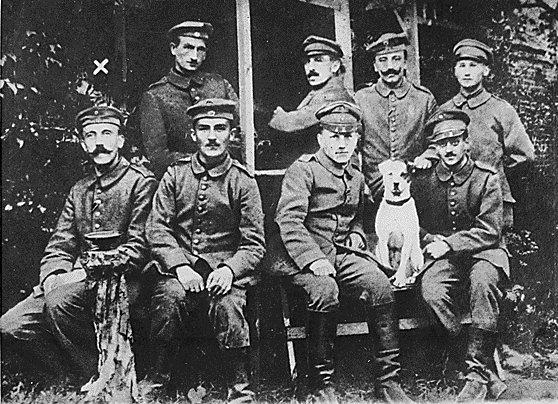
1918 World War I: Various:
Gefreiter Adolf Hitler's 16th RIR constructs fortified works in difficult defensive positions on an active front with German assault regiments near Fountaine (Montdidier). [For further details, Click here.]
Winston Churchill urges talks with Russia:
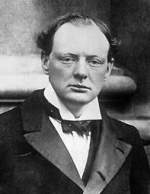
One month after Russia signed the Treaty of Brest-Litovsk, formally ending its participation in World War I, Winston Churchill secretly proposes to the British War Cabinet a method by which Britain's former ally could be persuaded to reenter the war. [For further details, Click here.]
1923 Albert Leo Schlageter: a member of the German Freikorps, the leader of an illegal "combat patrol" resisting the French occupying forces in the Ruhr by means of sabotage, is betrayed, possibly from within his own ranks. He is arrested the next day. Note: Within 6 weeks, Martin Bormann and his friend Rudolf Hoess will murder Walther Kadow, Bormann's former elementary school teacher, in the forest near Parchim, because he is suspected of having betrayed Schlageter.
1933 Various:
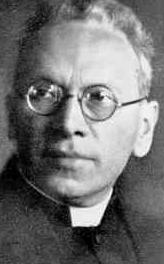
Church and Reich: Monsignor Kaas once again leaves Berlin on a trip to Rome. (THP)

Church and Reich: Franz von Papen leaves Berlin for Munich. Papen asks Fritz Menshausen to keep the purpose of his trip secret, indicating that he will tell the press he had gone to Rome for a vacation over the Easter holidays.
Holocaust: The Law for the Restoration of the Professional Civil Service, the first law meant to discriminate specifically against Jews is passed by the National Socialist regime in Germany. Thousands of Jews are barred from German civil service and judicial positions. All those who earlier had opposed the Nazis are at risk of losing their jobs. Hundreds of Catholics and Communists had already been replaced, and many more are soon to follow. Note: Jews who were frontline veterans of World War I, those in government service since 1914 and close relatives of fallen soldiers are temporarily exempted by the new law at Hindenburg's insistence. (THP)
[See: What Was the Nature of Hitler's Anti-Semitism?]The Law concerning State Governors strips the German states of their autonomous powers. Hitler appoints Reichsstatthuelter (Reich governors) in all German states, superseding the regular, elected governments. (THP)
[See: How Did Adolf Hitler Consolidate his Power?]Holocaust: Switzerland denies "political fugitive" status to Jews fleeing Germany. (THP)
1936 East Africa: Abyssinia again appeals to the League of Nations for aid against Italy.
1938 Romania: Codreanu is arrested, and will later die in prison:
When Carol felt secure, he ordered a brutal suppression of the Iron Guard and had Codreanu arrested on the charge that he had slandered Iorga. With the Captain in jail, Calinescu arrested the entire functioning body of the Legion. Those members that escaped or were omitted in the first place started a violent campaign throughout Romania, meant to coincide with Carol's visit to the Berghof, as a way to prevent the tentative approach between Romania and Nazi Germany. Confident that Hitler was not determined on supporting the Legion, and irritated by the incidents, Carol ordered the decapitation of the movement. http://propagander2.tripod.com/index-6.html[See: A Few Remarks on Democracy, by Corneliu Zelea Codreanu..]
1938 From a speech by Arthur Seyss-Inquart in Berlin:

The National Socialist Party in Austria never tried to hide its inclination for a greater Germany. That Austria would one day return to the Reich was a matter of course for all National Socialists and for true Germans in Austria. I asked the Fuehrer for armed assistance to save Austria from a civil war and from the fate of Spain because I had information that the workers' militia was to act as an armed military force at the Schuschnigg plebiscite.
[See: Austria: The Other Germany.]1939 World War II: Various:
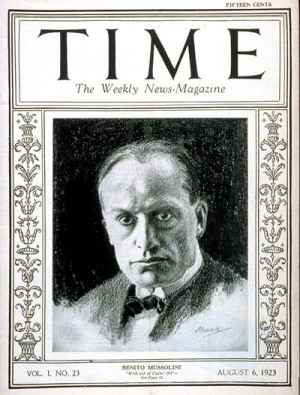
Italy invades Albania:
On this day in 1939, in an effort to mimic Hitler's conquest of Prague, Benito Mussolini's troops, though badly organized, invade and occupy Albania.
Although the invasion of Albania was intended as but a prelude to greater conquests in the Balkans, it proved a costly enterprise for Il Duce. Albania was already dependent on Italy's economy, so had little to offer the invaders. And future exploits in neighboring nations, in Greece in particular, proved to be disastrous for the Italians.
Anti-Comintern Pact: Spain joins Germany, Italy, and Japan.
1940 World War II: Various:
Norway: German ships leave port for the invasion. The British Home Fleet also leaves port for Norway.
From the Reich Foreign Minister (Ribbentrop) to the German Ambassador in the Soviet Union (Schulenburg):

You receive herewith two copies of a memorandum which will be presented by our envoys in Oslo and Copenhagen on April 9, at 5:20 a. m., German summer time, to the Governments concerned. Until the step which you are instructed to take below has been carried out, the strictest secrecy is to be maintained with regard to the memorandum and this instruction, and no mention thereof is to be made even to any other member of the Embassy. On April 9, at 7 a. m., German summer time, you are requested to ask for an interview with Herr Molotov, and, during the course of the morning. to hand him a copy of the memorandum. You will kindly emphasize orally that we had absolutely reliable reports regarding an imminent thrust of Anglo-French military forces against the Norwegian and Danish coasts and therefore had to act without delay. As outlined in the memorandum, it is a matter of security measures. Swedish and Finnish territory will in no way be affected by our action. The Reich Government is of the opinion that our actions are also in the interest of the Soviet Union, for execution of the Anglo-French plan which is known to us would have caused Scandinavia to become a theater of war, and that, in all probability, would have led to a reopening of the Finnish question. Please report immediately by wire how your communication is received.
1941 World War II: Press Reaction to Hitler's April 6 Speech:
In the early hours of Palm Sunday morning, praying God to lead the German Armies on their path, Adolf Hitler struck at two more small nations that wanted only to live their own lives in peace and freedom. The attack was begun in characteristic German fashion, with massed air assaults by Stuka bombers on a capital which had previously been declared an open city. It was followed, as all German attacks are followed, by an equally characteristic performance to which the foreign correspondents in Berlin were summoned, in order that they might hear from those in high authority how blameless is the German case, how shamefully the little German Reich had been bullied by big Yugoslovia and giant Greece, how noble the German nation felt, on this Palm Sunday morning, because its leaders had done everything to bring about a peaceful settlement."-New York Times
1943 Various:
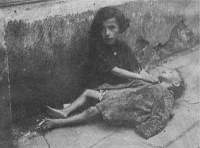
Holocaust: Poland: The annihilation of the Warsaw ghetto begins and will continue until June 16.
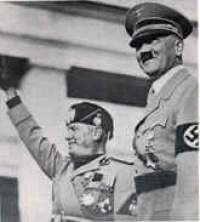
World War II: April 7-11 Hitler and Mussolini meet at Salzburg and decide to continue holding on in North Africa.
[See: How Did the Pact of Steel Effect Germany and Italy?]World War II: North Africa: British and American armies link up between Wadi Akarit and El Guettar, forming a solid line against the German army.
[See: What Was The Mediterranean Strategy, And Could it Have Enabled Hitler to Win the War?]Holocaust: Chelmno (Kulmhof) extermination camp discontinues its activities. Attempts are made to eliminate all traces of mass murder. (THP)
Holocaust: Terebovlia, Western Ukraine Germans order 1,100 Jews to undress to their underwear and march through the city of Terebovlia to the nearby village of Plebanivka. They were then shot dead and buried in ditches.
Von Stauffenberg: In Tunisia, Count Claus von Stauffenberg's automobile drives into a minefield, seriously wounding him. Stauffenberg loses his left eye, his right hand, part of his arm, and several fingers on his left hand. (THP)
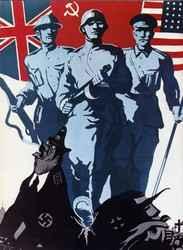
1945 World War II: Various:
Stalin to FDR:
[In] the course of our correspondence it has become evident that our views differ on the point as to what is admissible and what is inadmissible as between one ally and another. We Russians think that in the present situation on the fronts, when the enemy is faced with inevitable surrender, if the representatives of any one ally ever meet the Germans to discuss surrender the representatives of another ally should be afforded an opportunity of participating in such a meeting . . . . I still think the Russian point of view to be the only correct one, as it precludes all possibility of mutual suspicions and makes it impossible for the enemy to sow distrust between us.
2. It is difficult to admit that the lack of resistance by the Germans on the Western Front is due solely to the fact that they have been defeated. The Germans have 147 divisions on the Eastern Front. They could without prejudicing their own position detach fifteen or twenty divisions from the Eastern Front and transfer them to reinforce their troops on the Western Front. Yet the Germans have not done and are not doing this. They are continuing to wage a crazy struggle with the Russians for an insignificant railway station like Zemlyanitsa in Czechoslovakia, which is as much use to them as hot poultices to a corpse, and yet they yield without resistance such important towns in the center of Germany as Osnabruck, Mannheim, and Kassel. You will agree that such behavior on the part of the Germans is more than curious and unintelligible.
3. As regards my informants, I can assure you that they are extremely honest and modest people who discharge their duties conscientiously and have no intention of offending anyone.

Stalin to Churchill:
My messages are personal and strictly confidential. This makes it possible to speak one's mind clearly and frankly. This is the advantage of confidential communications. If however you are going to regard every frank statement of mine as offensive it will make this kind of communication very difficult. I can assure you that I had no intention of offending anyone . . . . You wonder why the Polish theatre of military operations must be wrapped in mystery. In fact there is no mystery here. You ignore the fact that if British observers or other foreign observers were sent into Poland the Poles would regard this as an insult to their national dignity, bearing in mind the fact moreover that the present attitude of the British Government to the Provisional Polish Government is regarded as unfriendly by the latter. So far as the Soviet Government is concerned, it cannot but take into account the negative attitude of the Provisional Government to the question of sending foreign observers into Poland. Further, you are aware that the Polish Provisional Government puts no obstacles in the way of entrance into Poland by representatives of other States which take up a different attitude towards it, and does not in any way obstruct them. This is the case, for instance, in regard to representatives of the Czechoslovak Government, the Yugoslav Government, and others. I had an agreeable conversation with Mrs. Churchill, who made a great impression on me. She gave me a present from you. Allow me to express my heartfelt thanks for this present.
The Japanese battleship Yamato—ostensibly the world's largest battleship—is sunk during the battle for Okinawa by US navy aircraft; Japan's first major counteroffensive in the struggle for Okinawa. Weighing 72,800 tons and outfitted with nine 18.1-inch guns, the battleship Yamato is Japan's only hope of destroying the Allied fleet off the coast of Okinawa. But insufficient air cover and fuel curse the endeavor as a suicide mission. Struck by 19 American aerial torpedoes, it is sunk, along with 2,498 of its crew. Meanwhile, Kantaro Suzuki becomes the 42nd Prime Minister of Japan.

1947 Death: Henry Ford: American automobile manufacturer and industrialist. In 1918, Ford's closest aide and private secretary, Ernest G. Liebold, purchased an obscure weekly newspaper, The Dearborn Independent. By 1920, Ford had become publicly antisemitic and in March of that year, began an anti-Jewish crusade in the pages of his newspaper. The Independent ran for eight years, from 1920 until 1927, during which Liebold was editor. The newspaper published "Protocols of the Learned Elders of Zion," which was discredited as a forgery during the Independent's publishing run by The Times of London. The American Jewish Historical Society describes the ideas presented in the magazine as "anti-immigrant, anti-labor, anti-liquor, and anti-Semitic". In February 1921, the New York World published an interview with Ford, in which he said "The only statement I care to make about the Protocols is that they fit in with what is going on". During this period, Ford emerged as "a respected spokesman for right-wing extremism and religious prejudice," reaching around 700,000 readers through his newspaper. Along with the Protocols, anti-Jewish articles published by The Dearborn Independent were also released in the early 1920s as a set of four bound volumes, cumulatively titled The International Jew, the World's Foremost Problem. Vincent Curcio writes of these publications that "they were widely distributed and had great influence, particularly in Nazi Germany, where no less a personage than Adolf Hitler read and admired them. Hitler, fascinated with automobiles, hung Ford's picture on the wall; Ford is the only American mentioned in Hitler's book. Steven Watts writes that Hitler "revered" Ford, proclaiming that "I shall do my best to put his theories into practice in Germany," and modelling the Volkswagen, the people's car, on the model T.
1954 Eisenhower gives famous "domino theory" speech:

President Dwight D. Eisenhower coins one of the most famous Cold War phrases when he suggests the fall of French Indochina to the communists could create a "domino" effect in Southeast Asia. The so-called "domino theory" dominated U.S. thinking about Vietnam for the next decade.
1994 Death: Golo Mann:a popular historian, publicist and writer. He was the third child of novelist Thomas Mann. As a reaction to Adolf Hitler's invasion in Paris in May 1940 Golo Mann decided to fight against the German invaders and to join a Czech military unit on French soil as a volunteer. But upon crossing the border he was arrested at Annecy and brought to French concentration camp Les Milles, a brickyard near Aix-en-Provence. In the beginning of August he was released by intervention of an American committee. On September 13 he undertook a daring escape from Perpignan across the Pyrenees to Spain.
Edited by Levi Bookin (Copy editor)
levi.bookin@gmail.com



Click to join 3rdReichStudies

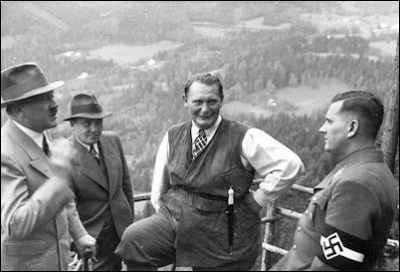
Please note that the list-owner and the moderator are not responsible for, and do not necessarily approve of, the random ads placed on our pages by our web server. They are the unfortunate price one pays for a 'free' website.
FAIR USE NOTICE: This site may contain copyrighted material the use of which has not always been specifically authorized by the copyright owner. We are making such material available in our efforts to advance understanding of historical, political, human rights, economic, democracy, scientific, environmental, and social justice issues, etc. We believe this constitutes a 'fair use' of any such copyrighted material as provided for in section 107 of the US Copyright Law. In accordance with Title 17 U.S.C. Section 107, the material on this site is distributed without profit to those who have expressed a prior interest in receiving the included information for research and educational purposes. If you wish to use copyrighted material from this site for purposes of your own that go beyond 'fair use', you must obtain permission from the copyright owner.